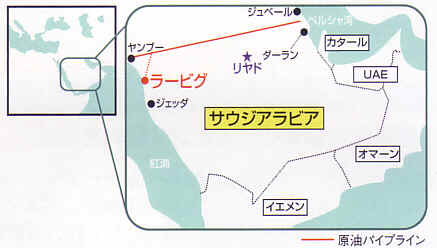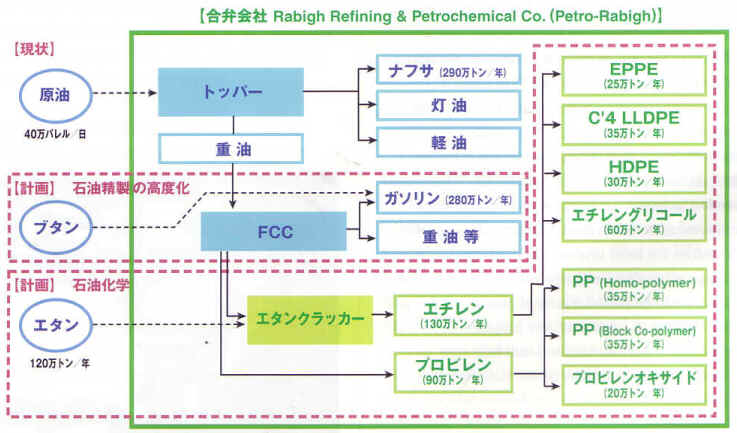トップページ
住友化学 中間事業報告書(2004/4/1〜2004/9/30)
グローバル戦略の新段階に進む「ラービグ計画」
| 産油地での立地による新たな事業展開 |
| |
住友化学は、本年5月に世界最大の産油国であるサウジアラビアの国営石油会社サウジアラビアン・オイル・カンパニー(サウジ・アラムコ)との間で、サウジアラビア紅海沿岸のラービグにおける石油精製と石油化学との統合コンプレックス開発計画「ラービグ計画」についての基本的な枠組みを定めた覚書を締結しました。現在、フィージビリティ・スタディー(FS/企業化調査)が進行中であります。そこで今回は、この新たな事業展開についてご紹介します。 |
| |
|
| ■ |
安価原料を確保し、世界市場における競争力を強化 |
| |
 ラービク計画は、石油会社と化学会社とがお互いの強みを生かし、石油精製と石油化学の統合コンプレックスとして世界最大級の設備を建設することでスケールメリットを追求するとともに、両事業の完全な一体化による相乗効果を最大限に発揮しようとする計画です。 ラービク計画は、石油会社と化学会社とがお互いの強みを生かし、石油精製と石油化学の統合コンプレックスとして世界最大級の設備を建設することでスケールメリットを追求するとともに、両事業の完全な一体化による相乗効果を最大限に発揮しようとする計画です。
当社は、ポリエチレン、ポリプロピレンからなるポリオレフィン事業を重点事業の一つと位置づけ、本年度からスタートした中期経営計画(04〜06年度)では、安価原料の安定的な確保を最重要課題としていますが、本計画はそのための最善のプロジェクトであり、世界市場における当社の競争力が飛躍的に強化されるものと考えております。 |
| |
|
| ■ |
エチレン130万トン・プロピレン90万トン、世界最大級のコンプレックス |
| |
当社とサウジ・アラムコは、本計画の事業主体として共同出資会社を設立したうえ、日量40万バレルと、サウジアラビアでも最大の原油処理能力をもつサウジ・アラムコの既存の製油所を譲り受けて高度化し、世界最大級の工タンクラッカーと流動接触分解装置(FCC)、さらにポリエチレン、ポリプロピレンなどエチレンとプロピレンの誘導品の生産プラントを新設します。
この結果、既存の製油所がこれまで生産してきたナフサや重油などの石油精製品にガソリンが加わり、さらに、大幅に安価な原料を用いたエチレン、プロピレンとその誘導品からなる石油化学製品が新たな生産品目として加わります。プラントの操業開始は2008年後半を目標としています。 |

| http://www.sabicamericas.com/oct-2005#1467 Saudi Aramco assumed full
control of the Rabigh refinery in June 1995, ending a
50-50 JV with Petrola of Greece. This gave Saudi Aramco
freedom to go ahead with an expensive upgrade, as Petrola
had been against the project for years. Saudi Aramco
replaced the top management of the refinery soon after
taking over. (Petrola used to sell its share of the
output to the Mediterranean market as well as to refiners
in Singapore and Australia).
The ethane
feedstock will be pumped from the Eastern Province
through the East-West pipeline, a twin-pipe crude oil
system, with the smaller (48-inch) line being converted
to carry gas in an $800m project. A spur line will be
built to Rabigh.
EPC contractors
submitted bids on Sept. 17 to Saudi Aramco for the
pipeline package on the Rabigh refinery conversion
project. Each contractor has submitted a base price and
an alternate offer. The base price is for the engineering
and installation works, while the alternate offer
includes the line pipe. The bidders include Saipem and
Techint of Italy, Suedrohrbau of the Netherlands,
Turkey's Tekfen, Lebanon's Contracting & Trading Co.
(CAT) and local firms Faysal M Qahtani Est. (FMQ) and
Tamimi Construction. The lump-sum turnkey (LSTK) contract
is estimated to be worth $100-200m. The successful bidder
will build parallel ethane and butane
pipelines
over 212 km, between the integrated Rabigh
refinery/petrochemicals plant and the existing Yanbu' NGL
facility. The contract also entails an access route on
the entire pipeline as well as numerous related
facilities including compressors, duty pumps and a
13.8-kV substation. UK-based Foster Wheeler Energy is the
project management services (PMS) contractor. A contract
award is set for late October, with the project due to be
completed by the second quarter of 2008.
|
March 23,
2009 Aramco
Al-Falih
Announces Projects to Develop Industrial Sector, Human Resources
In a speech during the “2009 Local Content Forum:
Opportunities and Challenges,”
held
at the Chamber of Commerce and Industry in the Eastern Province,
Saudi Aramco’s president and CEO
Khalid A. Al-Falih mentioned that a memorandum of understanding
(MOU) will soon be signed with Sumitomo Chemical for the Petro
Rabigh expansion. He also announced the establishment of an
industrial training center that will be located in al-Hasa, and
another to support the oil services based in Dammam.
The message he delivered to the group was that the current global
financial crisis proved that serious and bold investments in
establishing qualified institutions and companies, particularly
manufacturing companies, is a smart option that provides
lucrative, low-risk returns in the long run.
Al-Falih reassured the local industrial sector that, despite the
current tough global economic conditions and the challenges faced
by the energy sector, the Kingdom still holds on to its long-term
investments in expanding its oil and gas sectors and its programs
to enhance local and global energy supplies. Saudi Aramco’s numerous needs, he said, are
similar to those of other major sectors such as the
petrochemicals, water and electricity sectors.
Al-Falih also called for using the slackening periods witnessed
by the global economy to formulate future investment strategies
and prepare for the coming economic expansion periods.
He also called on the private sector to focus on accelerating the
development of oil and gas services as well as local industries
to turn the Kingdom from a net importer to a leading exporter of
oil and gas-related goods, services and technologies.
Al-Falih argued for utilizing the opportunities afforded by the
huge domestic investments being made by the Kingdom, the great
improvement in its investment environment, its remarkable advance
on the World Bank’s Ease of Doing Business
Index, and its solid national economy that continues to attract
investments during the current period of global economic
contraction and enables the government to continue its
developmental and infrastructure expansion projects.
On this occasion, Al-Falih announced that Saudi Aramco plans to
sign a memorandum of understanding (MOU) in the near future with
Sumitomo Chemical for the second phase of the Petro Rabigh
Complex (Petro Rabigh II). He also spoke of the huge investment
the company will make through its upcoming petrochemical project
in Ras Tanura ? a partnership with Dow Chemical of the USA. This
investment will amount to approximately SR 100 billion when
completed, and will include the construction of integrated
industrial cities where the private sector can invest in
conversion and support industries.
Al-Falih also announced two new major initiatives by Saudi Aramco
in the field of vocational training, in partnership with the
General Organization for Technical Educational and Vocational
Training (GOTEVT). The first involves the establishment of the
National Industrial Training Institute in al-Hasa, a new training
institute similar to those operated by the company. The company
will offer advice on the center’s design as well as
provide land with an area totaling 365,000 square meters for the
construction of the center which will features classrooms and
laboratories that can accommodate 2,000 trainees. The second
initiative Al-Falih announced was for the Saudi Technical
Petroleum Services Institute in Dammam, in partnership with the
Ministry of Petroleum and Mineral Resources, for which the
company will provide technical support.
The two institutes, Al-Falih said, aim to build national
expertise in the areas of exploration and production as well as
various other industries and to develop teaching staff and
curricula in the areas of oil exploration and production and
quality control. The company plans to utilize those two important
facilities, not only in training its own employees, but also in
creating highly-qualified Saudi employees to serve the oil, gas
and petrochemical sectors in general.
This, Al-Falih said, is an example of what the private sector can
accomplish through joint investment in the construction of
institutes that help develop the private sector’s business. Al-Falih uncovered
more initiatives in the area of developing the Kingdom’s human resources.
He expressed his gratitude for the Chamber of Commerce and
Industry in the Eastern Province for inviting him to this Forum
which was held under the auspices of HRH Prince Muhammad ibn Fahd
ibn 'Abd al-'Aziz, Amir of the Eastern Province. Al-Falih
received an honorary plaque from HE Dr. Khalid as-Sulayman,
deputy minister of Commerce and Industry for Industry Affairs and
the session’s moderator, in
recognition of Saudi Aramco’s sponsorship and active
participation in the Forum’s activities.
 ラービク計画は、石油会社と化学会社とがお互いの強みを生かし、石油精製と石油化学の統合コンプレックスとして世界最大級の設備を建設することでスケールメリットを追求するとともに、両事業の完全な一体化による相乗効果を最大限に発揮しようとする計画です。
ラービク計画は、石油会社と化学会社とがお互いの強みを生かし、石油精製と石油化学の統合コンプレックスとして世界最大級の設備を建設することでスケールメリットを追求するとともに、両事業の完全な一体化による相乗効果を最大限に発揮しようとする計画です。